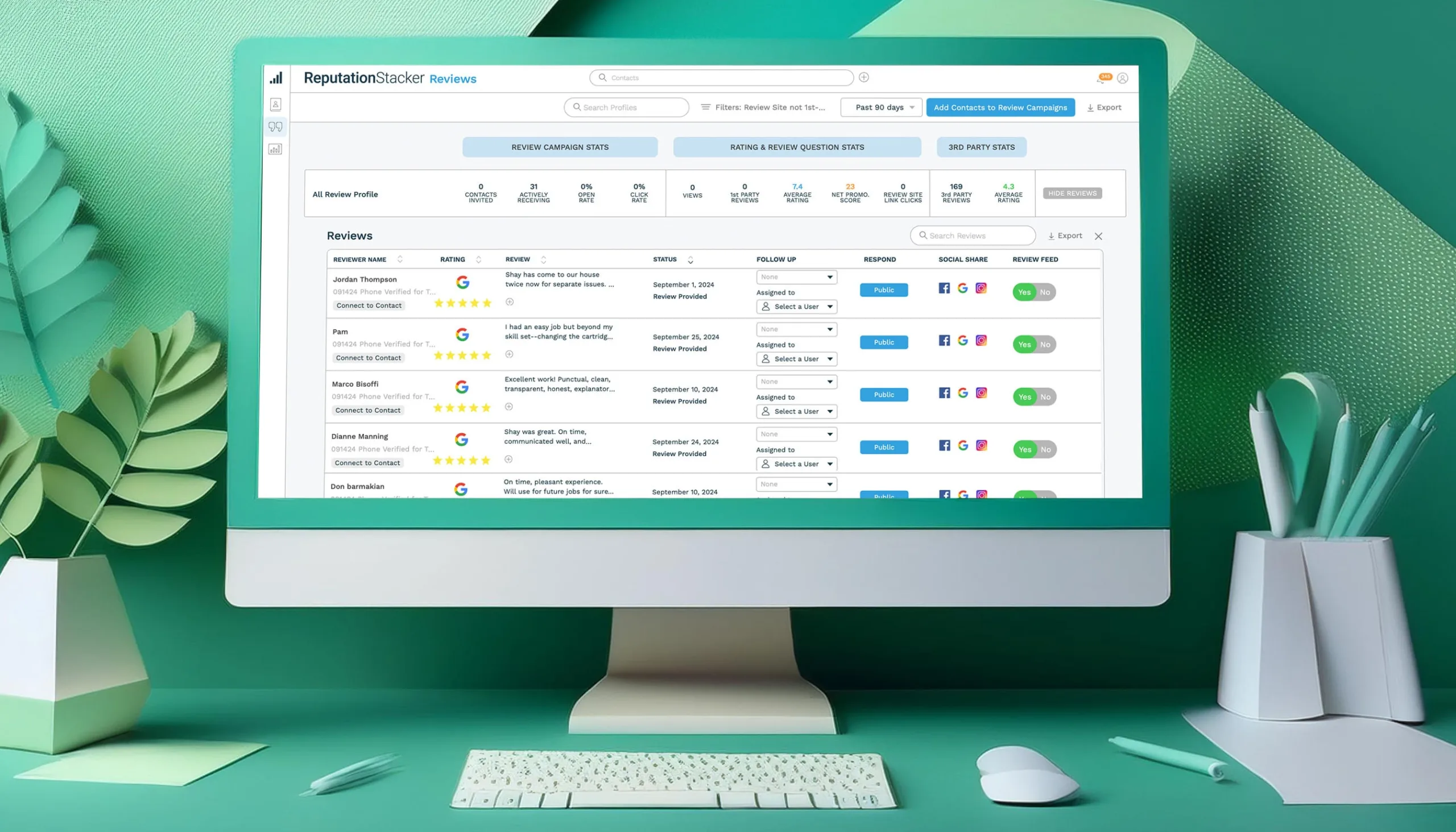The idea of managing and improving your business’s online reputation ranges somewhere between intimidating and impossible. Here we show you how simple it really is.
You can get a lot done in a few clicks these days. Just ask the people whose kids find their phones and “accidentally” order thousands of dollars of toys from Amazon in the space of 30 seconds.
If only it was that easy to improve your business’ online reputation. As any experienced owner or manager knows, cultivating a positive reputation is something that takes years of effort, tons of money and lots of one-on-one interactions with customers.
Wait a second… [Checks calendar, finds it’s no longer 1995.] Good news! A few clicks actually can improve your online reputation, if your clicking finger chooses wisely.
Passing a hard level of Candy Crush = wrong clicks. Embracing customer feedback software = right clicks.
What the Heck is My Online Reputation?

Some business owners or managers are surprised to learn that they have an online reputation, to say nothing of its importance.
Basically, your brand’s online reputation is the sum of everything that people are saying about you online.
If your ratings and reviews on sites like Yelp, TripAdvisor and Facebook are mostly raves and your customers routinely sing your praises on Facebook and Twitter, congratulations!
But if your reviews are a mix of positive, neutral and negative, or if there are virtual tumbleweeds rolling across your review pages, your reputation could use some work.
And it’s work that’s worth doing. Because even if yours is a brick-and-mortar business that’s been thriving for decades, your online reputation will play a huge role in determining your business’s future.
Just Like in High School, Reputation Matters

Hopefully, your business doesn’t have too much in common with high school. But one similarity that can’t be ignored is the importance of your reputation in dictating how others see you.
Imagine an average person in your community. Let’s call this person Alex. Alex is a parent with a full-time job, a house to take care of and a dog that will not stop destroying the couch no matter what. It’s time to buy a new couch, but Alex is picky; Barkley will eat almost anything, and this time the couch has to be super durable but also not crazy expensive.
So Alex navigates over to Yelp and starts looking at reviews of furniture stores. Polly’s Discount Furniture is where the last couch came from five years ago, so Alex will probably go there – but Polly’s Yelp rating is only a 3.3 (out of 5) and a few recent reviews say that the sales people are pushy and impatient.
Troy’s Furniture Barn has a 4.2 rating and the reviews say that the salespeople are fantastic. To boot, Alex remembers seeing a rave review of Troy’s that a friend recently posted to Facebook.
Decision easily made: Alex is going to Troy’s Furniture Barn.
But what Alex doesn’t realize is that Polly’s Discount Furniture has better prices than Troy’s, and the staff are actually excellent. A few impossible-to-please customers recently came in and took out their frustrations on Yelp. And because Polly didn’t have many Yelp reviews to start with, those negative comments from a few bad reviews dragged down Polly’s overall rating from a 4.3 to a 3.3.
Don’t take Polly’s word for it, though. Research shows just how much customers are influenced by reviews:
88% of American consumers surveyed say that they trust online reviews as much as they trust personal recommendations from friends and family.
49% of consumers want a business to have a minimum rating of four stars before they choose to use it.
73% of consumers trust a business more after reading its positive reviews.
Here’s the bottom line: your customers are reading reviews and making purchasing decisions based on what they read. You can’t afford to be like Polly and neglect your reputation.
Building a Strong Online Presence

These days, building a strong online presence is non-negotiable for any business aiming to establish a solid brand and reputation.
Think of your online presence as your digital storefront—it’s often the first impression potential customers will have of your business.
It goes without saying that you need a professional-looking website.
And the rule-of-thumb with your social media accounts is that if you can be consistently active and create content that engages your target audience, then go for it. On the other hand, if you’re just phoning it in with your social media, it’s generally a waste of your time and resources.
But when it comes to your reviews, you don’t have the same luxury.
Because your customers are going to write reviews, and potential customers are going to read them.
This is actually good news – great news even.
Because unlike other aspects of marketing and community interaction, building a customer review strategy is relatively easy and can largely be automated using reputation management software.
Monitoring and Managing Online Reviews

In case we haven’t made it clear: Online reviews are the lifeblood of your online reputation.
They offer a window into your customers’ experiences and can make or break your business’s image.
Getting a steady stream of reviews, and monitoring and managing these reviews is essential for building a strong brand reputation and drawing in more customers.
And while it’s of course important to respond to negative reviews, you should aim to respond to all of your reviews.
Why? Not only does is it a core function of reputation management to build consumer trust and increase customer satisfaction, it also helps you rank better in search.
You can manually ask all of your customers for reviews, and then monitor the most important review sites, checking these review sites daily and keeping tabs in a spreadsheet, or you can use software like ReputationStacker to do the work for you.
Not Your Grandpa’s Online Reputation Management

Establishing an online reputation strategy is crucial for maintaining a positive brand image and effectively handling customer feedback, so why not automate your online reputation management?
Getting reviews to help boost your online reputation used to require a lot of work on your part: determining which customers are happy and then actually getting them to post a review can be difficult.
All that hassle is now unnecessary, thanks to reputation management software.
These reputation management tools help businesses collect honest feedback, encourage customers to write reviews, leverage those reviews to attract new customers and generally help you grow your business.
Enter ReputationStacker.
ReputationStacker’s primary function is to help you get more reviews from your happy customers and give you an opportunity to turn bad customer experiences around.
The system also tracks the reviews your customers post, creates a feed of the best ones and shares them on your website and social media pages to attract new customers.
ReputationStacker does more than just help you improve your online reputation.
By generating more feedback from your real customers, the system helps you figure out exactly what you’re doing right and what you could be doing better.
Unlike some businesses that buy positive reviews, you’ll truly earn yours – and lay the foundation for years of further success.
Best of all? ReputationStacker is automated, which means that it requires just a few clicks from both you and your customers to start improving your online reputation.
The Final Click

You might not be able to tell, but your online reputation affects business every single day.
Generate more positive reviews, responding to them, and using them to get deep insights into your business is easy using ReputationStacker.
When you know what your customers are saying, when you’re consistently getting more positive reviews and when you’re leveraging those reviews to grow your business, improving the online reputation of your business is easy!
Frequently Asked Questions About How To Improve Your Business Online Reputation
What is online reputation management?
Online reputation management (ORM) is the practice of monitoring and influencing how your business is perceived online. It involves managing reviews, addressing negative feedback, and promoting positive content.
Why is a business’s reputation important online?
More than 90% of prospective customers research a business on the internet before deciding to do business with them. A positive reputation builds trust and credibility, while a negative reputation can deter future customers. Managing your business’s reputation is crucial for maintaining a competitive edge.
What should I do about negative reviews?
Addressing negative reviews is critical for maintaining a solid reputation. Respond quickly and professionally, acknowledging customer concerns. Apologize if necessary, and offer to resolve the issue. This shows future customers that you value feedback and are committed to improving customer experience, helping to mitigate the impact of negative reviews on your brand’s reputation. Check out our guide to responding to negative reviews (with review response examples).
What are some proactive reputation management strategies?
Proactive reputation management strategies include actively monitoring review sites and other online channels (like your social media accounts) for mentions of your brand, responding to all of your reviews, and engaging with customers on social media. Don’t overcomplicate your reputation management strategy: start small and focus on consistency.

How can social media platforms impact my business’s reputation?
Social media can significantly influence your business’s reputation. Positive interactions can help to create loyal customers and attract new clients, while negative comments or reviews can spread quickly and damage your online reputation. Regularly engage with your audience, respond to feedback, and use review monitoring software and social media monitoring tools to stay aware of conversations surrounding your brand.
What is online reputation marketing?
Online reputation marketing is a subset of online reputation management tactics that involves actively promoting your business’s positive attributes online. This can include creating content that highlights satisfied customers, showcasing positive testimonials, and addressing customer concerns & complaints publicly. By focusing on online reputation marketing, you can improve brand perception and positively influence search engine results related to your brand.
How do I handle negative comments on social media?
When facing negative comments on social media, respond calmly and professionally. Acknowledge the customer’s concerns and offer a solution. Avoid getting defensive, as this can escalate the situation. By addressing issues publicly, you demonstrate to potential customers that you care about their experience and are committed to resolving problems, strengthening your brand’s reputation.
How can I monitor my online reputation effectively?
To monitor your online reputation effectively, use reputation management tools that track mentions of your brand across various online platforms, including review sites and social media channels. Popular tools include ReputationStacker for reviews, and Hootsuite for social media.
What are the best practices for responding to customer complaints?
When responding to customer complaints, first consider how you would feel if you were in your customer’s situation. Address their specific concerns and outline steps you’re taking to resolve the situation. Keep it together! Stay professional and avoid getting defensive. A thoughtful response can turn a dissatisfied customer into a loyal one, positively impacting your online reputation.

What role does search engine optimization (SEO) play in reputation management?
SEO plays a critical role in online reputation management by influencing how your business appears in search engine results. By optimizing your website and getting a steady stream of positive reviews, you can push down negative reviews or comments in search rankings. This helps shape the perception of your brand and improves visibility to potential customers.
How can customer feedback improve my online reputation?
Customer feedback is essential for understanding your audience and addressing their needs. By actively seeking customer feedback and responding to it, you can identify areas for improvement, improve the customer experience, and demonstrate your commitment to satisfaction. Positive feedback can also be highlighted in marketing efforts, reinforcing a strong online reputation and improving customer retention.
What should I include in my online reputation management strategy?
An effective online reputation management strategy should include getting reviews and monitoring new reviews as they come in, engaging with customers on social media, and creating content. Include a plan for addressing negative feedback promptly and leveraging reviews and testimonials. Additionally, ensure consistent messaging across all online channels to reinforce your brand image and cultivate positive relationships with your audience.
How can local businesses improve their online reputation?
Local businesses can improve their online reputation by actively engaging with their community and encouraging customer feedback. Claim your business on review sites and social media platforms to manage your online presence. Regularly ask your customers for reviews and respond to reviews, both positive and negative, and create localized content that resonates with your target audience to improve your brand perception. Want more specific tactics? Check out our guide to online reputation management for local businesses.

